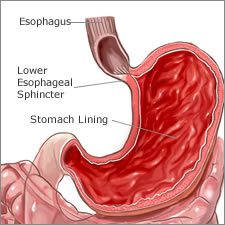Helicobacter Pylori

Helicobacter pylori or H. pylori is a type of bacteria that causes chronic inflammation to develop in the inner lining of the stomach and is a common cause of ulcers, gastritis and is also associated with some forms of stomach cancer. In the United States, an estimated 30% of the adult population is infected with H. pylori, but in less developed regions up to 90% of adult populations can be infected.
The H. pylori bacterium causes peptic ulcers to develop by damaging the protective mucous coating that lines the stomach and duodenum. By damaging this protective coating, the H. pylori bacterium makes it possible for stomach acid to reach sensitive lining in the stomach.
Many people with the H. Pylori infection develop the infection during childhood. The Helicobacter Pylori bacteria can be passed from person to person through saliva, vomit or fecal matter.
Certain lifestyle and environmental factors put you at an increased risk for developing the H. pylori infection. Living in crowded conditions or in a developing country severely increases your risk of contracting H. pylori, as does lacking a reliable supply of hot water. In addition, living with someone that has the infection also increases your risk.
Symptoms of H. Pylori
Many people that develop the H. pylori infection never develop any symptoms and are unaware that they are infected. Symptoms that result from the H. pylori infection are often due to the development of a peptic ulcer or gastritis. If peptic ulcers have developed, then the patient may experience signs and symptoms including:
- Abdominal pain
- Nausea
- Burping
- Bloating
- Weight Loss
Diagnosis of H. Pylori
If your gastroenterologist suspects that you have contracted the H. pylori infection then several tests are available to confirm the diagnosis. To determine if the H. pylori bacterium is present your physician may analyze a stool sample, conduct a simple blood test, or recommend an endoscopic exam. Another type of examination used to diagnose the H. pylori bacterium is a urea breath test (UBD), which is formulated for your physician to detect the H. pylori infection in the presence of radioactive carbon as you exhale.
Treatment of H. pylori
In most cases an H. pylori infection can be successfully treated with a combination of two or more antibiotics. Medications such as proton pump inhibitors (PPIs) may also be prescribed aid in treating the H. pylori infection.
If ulcers have developed, your gastroenterologist will provide you with further information concerning treatment options and prevention tactics that would be beneficial to you.


